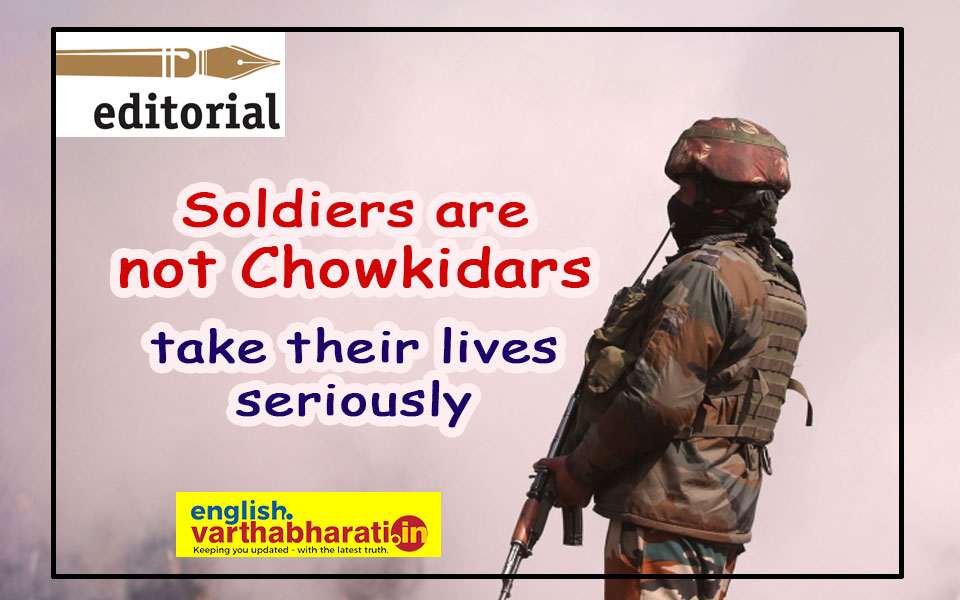In the suicide attack carried out by a terrorist in Pulwama few weeks ago, 40 of our CRPF jawans were killed. We still have not come out of that shock and another incident has been reported from paramilitary camp in Udhampur of Jammu Kashmir on Wednesday night. A CRPF Jawan has shot dead three of his superiors and attempted to kill himself too at the end. It is said that the jawan has a psychological condition that prompted him to do so. Unfortunately our soldiers are causing big damage and killing themselves over complications relating to their mental health. The number of soldiers who kill themselves is higher than the ones that get killed in the warfront, as per a report submitted to the home ministry to the parliamentary committee last year.
In the last six years, more than 700 soldiers have committed suicide in para military troupes in our country. This is the case of paramilitary such as CRPF. But the situation is not any different in defence sector either. Last year alone, 80 soldiers have committed suicide including 8 from navy, and 16 from Army. In 2017, 75 soldiers had committed suicide and 104 had killed themselves in 2016. As per defence ministry data, about 348 soldiers have ended lives between 2014-17 while on duty.
Unfortunately our BSF, CRPF, CAPF, ITBP, SSB and other security agencies lose more men to suicide than in operations. Another concerning issue is many recruited soldiers are quitting service midway even before the completion of their term. For instance about 44,000 men left service either by resignation or voluntary retirement between 2009 and 2012. This has raised some serious questions about internal aspects of our armed forces. Working in such agencies is not the same as working elsewhere. Those men carry the responsibility of the entire nation on their shoulders. It is the responsibility of every citizen to be concerned about their welfare. Every time a soldier kills himself, a possible reason is given. But such issues are not as simple as they seem at the outset.
Senior officers of different defence forces have conducted a study into the matter and have found a few reasons that led the soldiers into such extreme steps. For example: people serving in security forces have to stay far from their families and friends. A normal jawan spends 25 years of his 30 year service period on the line of duty. He gets less than five years to be with his family. To reach home during their month-long holiday takes many days if they hail from remote parts of India. In the next few days, he has to again return to his workplace. Weather is too adverse in places like North East and Kashmir. Mind and body both undergo a lot of uncertainties when serving in such areas.
Jawans and those working under their category do not get any better facilities as the higher officers do. Many people in these forces have a lot of simmering discontentment regarding this. Repeated transfers lead to mental stress. Jawans are angry about the lowly comments and mental torture they have to hear from their seniors. They hate doing personal tasks for their seniors. Promotion hardly comes by and even if a jawan is most diligent, he has to wait at least for 15-20 years till he is promoted. This leads to major feeling of discontentment.
The limitations within security forces are the reason why jawans are subjected to harassment. Government and senior officers have taken up a few reconciliatory steps to fix this disparity. Services of mental health professionals has been sought to address many issues during times when they leave on holiday, come back from home and at the time of their joining. This gives them some solace. Uniforms and food has been improved, and family accommodation is being provided to those who are newly married and been posted by the border. Yoga, sports and entertainment opportunities have been increased. But none of these have brought any solace to the soldiers who feel these are just bare compensation.
At the same time, vacant positions across the army are another reason for increased pressure on soldiers. About 61,000 recruitments are awaited. CRPF needs 18,000, BSF needs 11,000, CISF needs 3,182, UTBP needs 5,786, Sashastra Seemabal needs 18,942, Assam Rifles needs 3,840 posts to be filled up. As of now the soldiers have to cover up for those posts too which have been lying vacant. Hence they face additional work pressure. These posts are to be filled on priority. Staff of security agencies are the ones that guard us with their lives. It is the duty of the country to provide them with proper facilities. Our central government, especially the defence ministry has to do the needful since this is the question of India’s safety.
Let the Truth be known. If you read VB and like VB, please be a VB Supporter and Help us deliver the Truth to one and all.
Kalaburagi: Four men have been arrested in Kalaburagi on charge of hacking a man with lethal weapons and pelting stones at him under the limits of Station Bazaar Police Station recently.
According to police sources, Anand Jalak Shinde (34), Ashitosh Jalak Shinde (30), Imran Mehboob Sheikh (28) and Sohaib Anwar Qureshi have been arrested. The men are accused of the brutal murder of Syed Mehboob, a resident of Station Bazaar Upper Line Hamalawadi in the city.
An FIR was filed by the Station Bazaar Police Station based on a complaint given by Syed Ismail, father of the deceased Syed Mehboob.
Following quick probe, the police team successfully arrested the suspects within 24 hours. The arrested men were produced in court and have been sent to judicial custody.
The City Police Commissionerate has appreciated in an official release the police team’s quick solving of the murder case and arrest of the four men accused of murdering Syed Mehboob.





